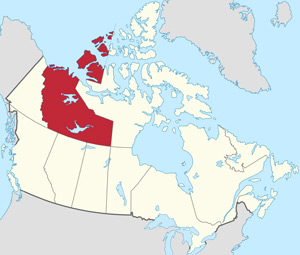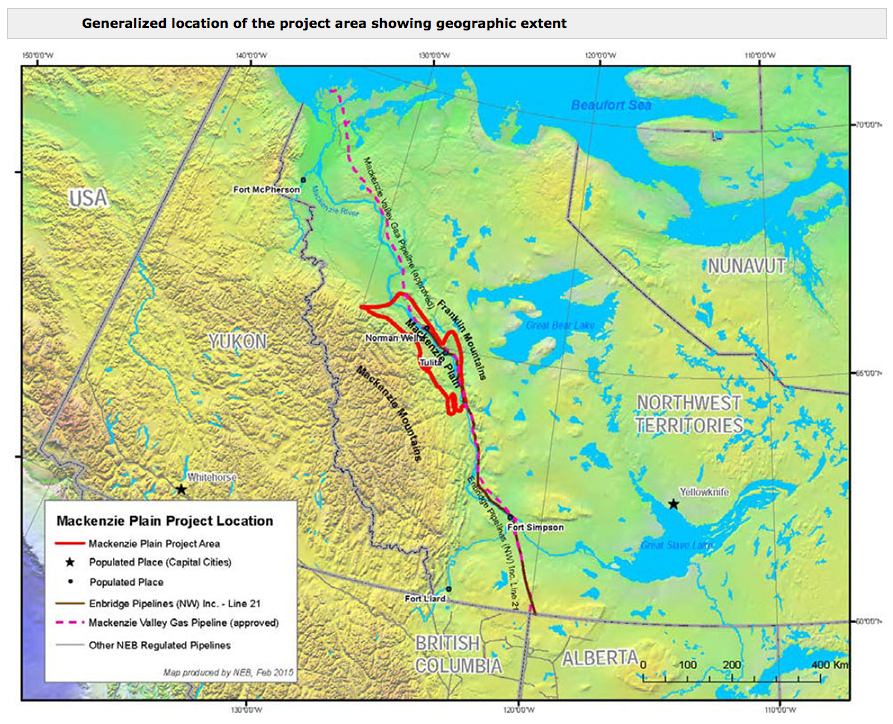par energy_isere » 31 mai 2015, 14:00
Et allez, encore des milliards de barils d' oil shale en place dans le Nord Canadien.
Ca pourrait être encore bien plus gros que les Bakken des tazus.
Peut être 7 milliards de barils récupérables.
Seul problème, il y a zéro infrastructures.
C'est pas complétement neuf, 14 licenses d' explorations avaient été concédées en 2010 à plusieurs compagnies, avec à la clé 628 millions de $ d' investissemenst à réaliser.
Mais ici, c' est la premiére fois que c' est rapporté.
Canada’s New Shale Oil Field Could Rival the Bakken
By PETER KRAUTH, Resource Specialist, Money Morning May 29, 2015
Canada's energy industry may be most famous for its world-class oil sands resources. But a new shale oil field could surpass the oil sands as Canada's largest untapped oil reserve.
In fact, it could even rival the massive Bakken shale of North Dakota in terms of recoverable oil.
This area lies north of British Columbia and east of the Yukon. It's the Northwest Territories.
Recent data from the National Energy Board (NEB) and the Northwest Territories Geological Survey shows that this area holds as much as 200 billion barrels of shale oil reserves. That compares to U.S. Geological Survey estimates that the Bakken shale formation will yield 4.3 billion barrels.
Not all of this Canadian oil is necessarily recoverable. But the Canol and Bluefish shales contain a total approaching 7 billion barrels of economically viable resources.
Here's a look at the vast potential of Canada's Northwest Territories…
A New Shale Oil Field with "Significant Potential"
Shale Oil FieldMajor oil companies have been exploring this area just 145 kilometers south of the Arctic Circle, known as the Mackenzie Plain, for some time.

Major oil companies have been exploring this area just 145 kilometers south of the Arctic Circle, known as the Mackenzie Plain, for some time.
Oil producers such as Husky Energy Inc. , Imperial Oil Ltd., Royal Dutch Shell Plc., and ConocoPhillips have performed exploratory drilling in the Canol field.
A total of 14 exploration licenses have been granted with $628 million in work commitments dating back to 2010.
The Canol Field could hold as much as 145 billion barrels of oil. That's comparable to Texas' Permian basin, where about 3% of oil in place is currently being recovered by operators.
The Bluefish shale has yet to even be explored. It could hold up to 46 billion barrels.
David Ramsay, Minister of Industry, Tourism and Investment for the Government of the Northwest Territories, commented on the NEB data, saying, "This study confirms what we have known all along – that there is significant petroleum potential in the Sahtu."
Developing these fields could be a ways off, however. Some living in the territory as well as Greenpeace oppose fracking, claiming it could contaminate groundwater.
Perhaps an even larger obstacle to development is infrastructure. The area's remote location currently lacks such basic services as an all-weather road. A pipeline system to carry the recovered oil and gas to market will also need to be built eventually.
So now the big question: Can investors profit from this new Canadian shale oil field?
http://moneymorning.com/2015/05/29/cana ... he-bakken/
c'est la, vers le fleuve MackEnzie :

source :
http://www.mining.com/canadas-territori ... ken-field/
L' info ressort parce que le Canada’s National Energy Board (NEB) à sorti les conclusion d' une étude sur le sujet.
145 milliards de barils en place dans Canol Shale + 46 milliards de barils en place dans Bluefish Shale.
C 'est du ''en place'' , sachant que les techniques ne peuvent en récupérer que quelques %. Et bien sur il faut la fracturation hydraulique.
The central Northwest Territories is home to around 200 billion barrels of oil, according to a new assessment released on Friday.
Canada’s National Energy Board (NEB), working with the NWT’s Geological Survey, says the Canol Shale holds an estimated 145 billion barrels of oil, with the Bluefish Shale accounting for a further 46 billion barrels.
According to the NEB, this is scientists’ first real insight into the size of these reserves, located west of Great Bear Lake.
“The numbers are staggering,” David Ramsay, the territorial minister of industry, tourism and investment, told Moose FM.
“We’ve known there’s oil there but when you put numbers to it, those numbers are quite large and quite exciting for the Northwest Territories.
“This is a resource that we get to manage now, in looking at jobs and opportunities for the people of the Northwest Territories.”
Full announcement: NEB and NTGS assess Bluefish and Canol Shales
However, Ramsay noted that extracting any of the oil will require the use of hydraulic fracturing, or fracking.
Fracking remains a contentious issue in the NWT. The territorial government is proposing a new regulatory framework to govern the practice, but the Dene Nation, among others, has called for a slower approach so people can “learn about the process and the risks involved” before decisions are made.
“If there’s no hydraulic fracturing, those resources can’t be extracted,” admitted Ramsay.
...............
http://www.myyellowknifenow.com/5284/st ... -fracking/
Acuellement la région ressemble à ça :
 http://business.financialpost.com/news/ ... =efe7-71b9
http://business.financialpost.com/news/ ... =efe7-71b9
par contre dans 20 ou 30 ans .......

[b]Et allez, encore des milliards de barils d' oil shale en place dans le Nord Canadien.
Ca pourrait être encore bien plus gros que les Bakken des tazus.
Peut être 7 milliards de barils récupérables.
Seul problème, il y a zéro infrastructures.
C'est pas complétement neuf, 14 licenses d' explorations avaient été concédées en 2010 à plusieurs compagnies, avec à la clé 628 millions de $ d' investissemenst à réaliser.
[/b]
Mais ici, c' est la premiére fois que c' est rapporté.
[quote] [size=140][b]Canada’s New Shale Oil Field Could Rival the Bakken[/b][/size]
By PETER KRAUTH, Resource Specialist, Money Morning May 29, 2015
Canada's energy industry may be most famous for its world-class oil sands resources. But a new shale oil field could surpass the oil sands as Canada's largest untapped oil reserve.
In fact, it could even rival the massive Bakken shale of North Dakota in terms of recoverable oil.
This area lies north of British Columbia and east of the Yukon. It's the Northwest Territories.
Recent data from the National Energy Board (NEB) and the Northwest Territories Geological Survey shows that this area holds as much as 200 billion barrels of shale oil reserves. That compares to U.S. Geological Survey estimates that the Bakken shale formation will yield 4.3 billion barrels.
[color=#FF0000]Not all of this Canadian oil is necessarily recoverable. But the Canol and Bluefish shales contain a total approaching 7 billion barrels of economically viable resources[/color].
Here's a look at the vast potential of Canada's Northwest Territories…
[b]A New Shale Oil Field with "Significant Potential"[/b]
Shale Oil FieldMajor oil companies have been exploring this area just 145 kilometers south of the Arctic Circle, known as the Mackenzie Plain, for some time.
[img]http://moneymorning.com/wp-content/blogs.dir/1/files/2015/05/Shale-Oil-Field.jpg?306c1a[/img]
Major oil companies have been exploring this area just 145 kilometers south of the Arctic Circle, known as the Mackenzie Plain, for some time.
[color=#FF0000]Oil producers such as Husky Energy Inc. , Imperial Oil Ltd., Royal Dutch Shell Plc., and ConocoPhillips have performed exploratory drilling in the Canol field.
A total of 14 exploration licenses have been granted with $628 million in work commitments dating back to 2010.[/color]
The Canol Field could hold as much as 145 billion barrels of oil. That's comparable to Texas' Permian basin, where about 3% of oil in place is currently being recovered by operators.
The Bluefish shale has yet to even be explored. It could hold up to 46 billion barrels.
David Ramsay, Minister of Industry, Tourism and Investment for the Government of the Northwest Territories, commented on the NEB data, saying, "This study confirms what we have known all along – that there is significant petroleum potential in the Sahtu."
Developing these fields could be a ways off, however. Some living in the territory as well as Greenpeace oppose fracking, claiming it could contaminate groundwater.
Perhaps an even larger obstacle to development is infrastructure. The area's remote location currently lacks such basic services as an all-weather road. A pipeline system to carry the recovered oil and gas to market will also need to be built eventually.
So now the big question: Can investors profit from this new Canadian shale oil field?
[/quote]
http://moneymorning.com/2015/05/29/canadas-new-shale-oil-field-could-rival-the-bakken/
c'est la, vers le fleuve MackEnzie :
[img]http://www.mining.com/wp-content/uploads/2015/05/mackenzie-plain-map.jpg[/img]
source : http://www.mining.com/canadas-territories-hold-massive-shale-oil-reserves-similar-to-us-bakken-field/
L' info ressort parce que le Canada’s National Energy Board (NEB) à sorti les conclusion d' une étude sur le sujet.
145 milliards de barils en place dans Canol Shale + 46 milliards de barils en place dans Bluefish Shale.
C 'est du ''en place'' , sachant que les techniques ne peuvent en récupérer que quelques %. Et bien sur il faut la fracturation hydraulique.
[quote][b]The central Northwest Territories is home to around 200 billion barrels of oil, according to a new assessment released on Friday.[/b]
[color=#FF0000]Canada’s National Energy Board (NEB), working with the NWT’s Geological Survey, says the Canol Shale holds an estimated 145 billion barrels of oil, with the Bluefish Shale accounting for a further 46 billion barrels.[/color]
According to the NEB, this is scientists’ first real insight into the size of these reserves, located west of Great Bear Lake.
“The numbers are staggering,” David Ramsay, the territorial minister of industry, tourism and investment, told Moose FM.
“We’ve known there’s oil there but when you put numbers to it, those numbers are quite large and quite exciting for the Northwest Territories.
“This is a resource that we get to manage now, in looking at jobs and opportunities for the people of the Northwest Territories.”
Full announcement: NEB and NTGS assess Bluefish and Canol Shales
However, Ramsay noted that extracting any of the oil will require the use of hydraulic fracturing, or fracking.
Fracking remains a contentious issue in the NWT. The territorial government is proposing a new regulatory framework to govern the practice, but the Dene Nation, among others, has called for a slower approach so people can “learn about the process and the risks involved” before decisions are made.
“If there’s no hydraulic fracturing, those resources can’t be extracted,” admitted Ramsay.
...............[/quote]
http://www.myyellowknifenow.com/5284/staggering-nwt-oil-reserve-revealed-but-itll-need-fracking/
Acuellement la région ressemble à ça :
[img]http://wpmedia.business.financialpost.com/2015/05/mackenzie_plain.jpg?w=620[/img]
http://business.financialpost.com/news/energy/northwest-territories-sitting-on-massive-shale-oil-reserves-on-par-with-booming-bakken-field-in-u-s?__lsa=efe7-71b9
par contre dans 20 ou 30 ans ....... :-&